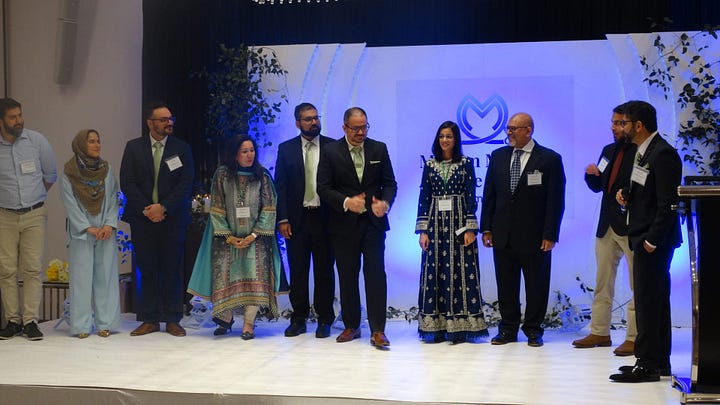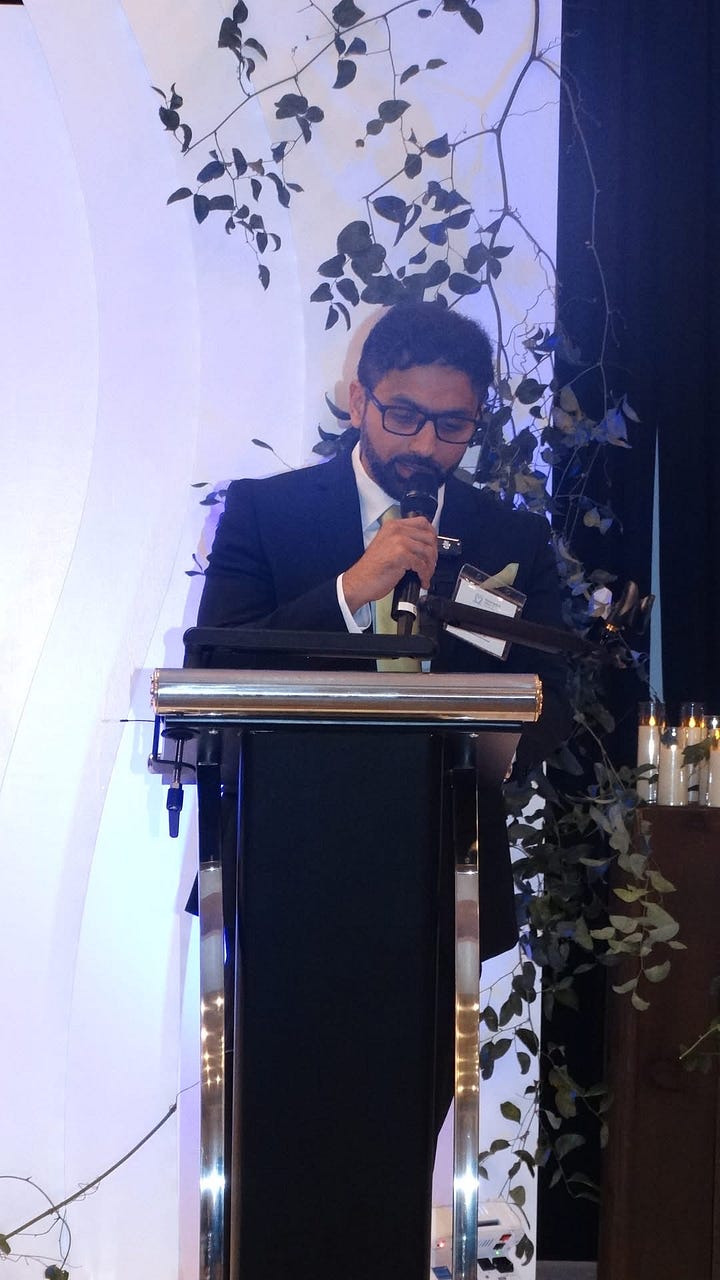Dallas Muslim Medical Alliance Gala Unites Healthcare Leaders, Announces Landmark Journalism Endowment


The Dallas Muslim Medical Alliance (DMMA) hosted its most impactful annual gala to date, drawing a sold-out crowd of over 550 physicians, dentists, and healthcare leaders from North Texas to Dallas. The event, held recently, spotlighted DMMA’s expanding influence in uniting clinicians from diverse specialties and backgrounds around a mission of healing patients and the healthcare system with integrity, compassion, and collaboration. The evening’s highlights included a rousing leadership address, a pioneering journalism endowment launch, and inspiring remarks from keynote speakers, all underscoring the alliance’s commitment to excellence, advocacy, and community trust.
A Gathering of Healers and Leaders
The DMMA gala marked a milestone for the organization, which has grown rapidly in membership and impact since its founding. The sold-out event at a prominent Dallas venue reflected the alliance’s ability to convene a broad cross-section of the region’s medical community, including physicians, dentists, researchers, and healthcare administrators. The atmosphere was celebratory yet purposeful, as attendees shared mentorship, service, and professional achievement stories.
Newly inaugurated DMMA President Dr. Rahman Mohammed set the tone for the evening with a powerful address. “Physicians are not just healers—we are leaders. Though Muslims make up just 1–2% of the U.S. population, we represent nearly 10% of its doctors. That’s not just a statistic—it’s a responsibility. And our greatest work lies ahead,” Dr. Mohammed told the audience. He emphasized DMMA’s commitment to serving the North Dallas medical community and beyond, promoting excellence in care, ethical advocacy, mentorship, and civic service.
DMMA Launches Healthcare Journalism Endowment
A defining moment of the gala came when DMMA’s Founding Chair, Dr. Abdul Ahad Hayee, introduced a bold new initiative: an endowment to support culturally competent healthcare journalism. “The story is as important as the science,” Dr. Hayee stated. “When headlines shape public safety and perception, we must ensure they reflect truth, not stereotypes.” The endowment aims to fund journalists who can elevate public understanding of medicine while fostering trust across communities of every background.
Dr. Hayee’s remarks resonated with recent developments in journalism, where experts have called for more inclusive and accurate storytelling. “Reparative journalism is more than content and infrastructural repair; it is also a reclamation of the lineage of storytelling,” according to a recent report on reparative journalism, highlighting the importance of centering marginalized voices and correcting historical biases in media coverage. Dr. Hayee added, “We hold the scalpel; journalists hold the pen. Both tools can save lives.”
Keynote Insights: Unity, Innovation, and Authentic Storytelling
The gala featured a keynote address by Dr. Shehzad Batliwala, an eye surgeon, humanitarian, and pioneer in space medicine. Dr. Batliwala, whose journey from undocumented immigrant to medical innovator has inspired audiences worldwide, shared a profound message: “Unity is physics. Braid our strands into a rope strong enough to lift the entire healthcare system.” His remarks drew on his NASA-sponsored mission and underscored the importance of collaboration and resilience in medicine.
Award-winning journalist Saad Yousef, known for his work with The Athletic and NYT Radio, explored the critical role of authentic storytelling in a time of misinformation and cultural distortion. Yousef highlighted the responsibility of journalists to provide accurate, nuanced narratives that reflect the complexities of healthcare and the lived experiences of diverse communities. “True and compelling stories about health issues educate and raise awareness, making the information more accessible and relatable,” Yousef said, echoing themes from recent scholarship on the power of health journalism.
Celebrating Achievement and Community
The evening also recognized the achievements of DMMA members and featured a comedy segment that brought heart and humor to shared professional struggles. Standout performances by Farooq Hussain, Bucky Waqas, and Marena Riyad provided a lighthearted counterpoint to the evening’s serious themes, reminding attendees of the importance of joy and connection in the demanding healthcare field.
The event’s success was a testament to the alliance’s ability to foster a sense of belonging and purpose among its members. “We are not just a professional organization—we are a community,” said one attendee, a pediatrician who has been involved with DMMA since its inception. “This gala reminds us why we do what we do.”
The Rise of Muslim Medical Professionals in America
Muslim Americans have long been a vital and growing presence in the U.S. healthcare system. Despite making up just 1–2% of the population, Muslims account for nearly 10% of the nation’s physicians—a statistic that reflects both the community’s commitment to education and service and the unique challenges they face in navigating cultural and religious identities in the workplace1. Organizations like DMMA provide essential support, mentorship, and advocacy for Muslim healthcare professionals, helping them to thrive and lead in their fields.
The alliance’s work is especially relevant in a time of heightened scrutiny and discrimination against Muslim communities. Recent investigations into proposed Muslim housing developments in North Texas, for example, have highlighted the persistent challenges of religious bias and stereotyping. DMMA’s focus on leadership, advocacy, and community building offers a powerful counter-narrative to these trends.
The Role of Storytelling in Healthcare and Public Trust
The launch of DMMA’s journalism endowment reflects a growing recognition of the importance of storytelling in shaping public health outcomes. “The media plays a crucial role in public health by serving as a powerful conduit for information dissemination and shaping public perceptions,” according to experts in health journalism. Accurate, culturally competent reporting can help to combat misinformation, build trust, and promote health equity.
The endowment will support journalists committed to telling the stories of marginalized communities, amplifying the voices of patients and providers often overlooked in mainstream coverage. “By doing so, journalists contribute to delivering reliable views and insights to safeguard the integrity of health information for their audience,” noted a recent analysis of health journalism’s impact.
The Future of DMMA and Healthcare Leadership
As DMMA looks to the future, the organization is poised to expand its impact through new mentorship, advocacy, and community engagement initiatives. The journalism endowment is just the beginning of a broader effort to bridge the gap between medicine and media, ensuring that the stories of healthcare professionals and their patients are told with accuracy, empathy, and respect.
The alliance’s leadership remains committed to fostering a culture of excellence, inclusion, and service. “Our greatest work lies ahead,” Dr. Mohammed reiterated in his closing remarks. “Together, we can heal our patients and the systems that serve them.”
A Night of Inspiration and Vision
The DMMA annual gala celebrated achievement, community, and vision. By bringing together healthcare leaders from across North Texas, the event demonstrated the power of unity, collaboration, and authentic storytelling in advancing the cause of health equity. Launching the journalism endowment marks a bold step forward in DMMA’s mission to heal patients and the healthcare system, ensuring that the voices of Muslim medical professionals and their communities are heard and respected.
As DMMA continues to grow and innovate, its impact will be felt far beyond the walls of the gala venue. It will shape the future of healthcare leadership, advocacy, and storytelling in North Texas and beyond.
“Physicians are not just healers—we are leaders. Though Muslims make up just 1–2% of the U.S. population, we represent nearly 10% of its doctors. That’s not just a statistic—it’s a responsibility. And our greatest work lies ahead.”
— Dr. Rahman Mohammed, DMMA President“The story is as important as the science. When headlines shape public safety and perception, we must ensure they reflect truth, not stereotypes.”
— Dr. Abdul Ahad Hayee, DMMA Founding Chair“Unity is physics. Braid our strands into a rope strong enough to lift the entire healthcare system.”
— Dr. Shehzad Batliwala, Keynote Speaker


